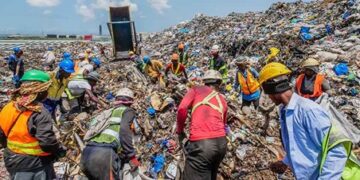Minister-designate for Environment, Science, and Technology, Ibrahim Murtala, has rejected outright calls for a ban on plastic use, arguing that a more measured approach is necessary to stabilize waste management systems before implementing drastic measures.
Speaking before Parliament today, Murtala vowed to reinforce the practice of refuse segregation rather than rushing into a total ban on plastics, a position he insists would be premature and impractical without adequate groundwork.
“You don’t just ban… You need to be looking for alternatives,” he stated. “Let’s have comprehensive alternatives. This is to be able to stabilize the system before, if there is the need to ban, we will go ahead and ban.”
His remarks come amid increasing concerns over Ghana’s worsening waste management crisis. The World Bank estimates that global municipal solid waste generation stands at 2.01 billion tons annually, projected to surge by 70% to 3.4 billion tons by 2050 if urgent actions are not taken. Ghana, like many developing nations, grapples with ineffective waste disposal systems, generating approximately 12,710 tonnes of solid waste daily, with only 10% being properly collected and disposed of.
Murtala outlined his strategy for mitigating the environmental impact of plastic waste, stressing the importance of public education and systematic refuse segregation.
“In other jurisdictions, segregation starts at home and then in the communities. That is not what we experience in our part of the world,” he observed. “If there is the possibility for the state to intervene, perhaps by taking advantage of private entities interested in waste management, we will introduce education and sensitization so that people will be able to segregate liquid waste from solid waste.”
He emphasized that the lack of proper waste segregation leads to severe sanitation challenges at dumping sites, urging that responsibility for solid waste management should not rest solely with the state.
“Solid waste disposal is not only the responsibility of the state. It is also the responsibility of individuals,” he stated, calling for a collective approach to tackling the crisis.
Murtala revealed plans to engage the Ministries of Health and Education to integrate waste management awareness into broader public policy, ensuring long-term behavioral change in waste disposal practices.
With the nation at a crossroads in its battle against plastic pollution, the minister-designate’s stance presents a nuanced approach—one that balances immediate environmental concerns with pragmatic implementation strategies. Whether this approach will be enough to curb Ghana’s mounting waste crisis remains to be seen.
Ruth Sekyi – ABC News GH

































